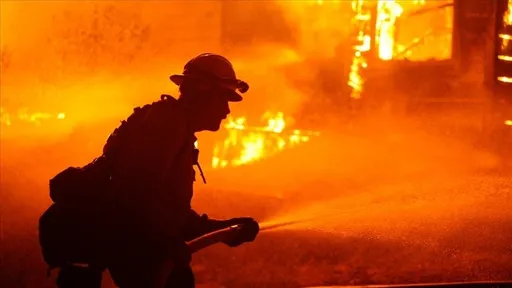Psychotherapists in war-torn Gaza have helped thousands of Palestinians overcome trauma from living under blockade, poverty and violence.
Gaza, home to 2 million Palestinians, has lived under Israeli blockade since 2007 with basic services at risk of collapse compounded by several wars of aggression from Israel.
The economic situation is dire and the poverty rate has risen to 59 percent from 43 percent five years ago, according to the World Bank. In addition to blockade and the fallout from war, many blame Palestinian factionalism for Gaza’s deteriorated economy.
Gaza's feeble health system was brought to its knees by the fourth war in just over a decade.
Living within this context of fear or trauma has affected Gaza’s population as well as its therapists and mental health professionals.
Suicidal ideation and risk-taking behaviour
The bombardment of Gaza in May 2021 is the fourth major escalation a 13-year-old child in Gaza would have lived through, following Israel's invasions of 2008, 2012, and 2014. It killed at least 248 Palestinians, 66 of whom were children, and injured about 1,900. The war destroyed schools and medical facilities; and displaced upwards of 72,000 children.
According to a report from the Euro-Mediterranean Human Rights Monitor, 91 percent of Gazan children now suffer from some form of conflict-related trauma.
The study, which surveyed 530 children across Gaza to observe behaviour changes found that prior to the attack, about 33 percent of children in Gaza needed mental health support as a result of conflict-induced trauma.
What is special about the situation in Gaza is that people especially children are repetitively exposed to traumas, they feel that there is no escape and as a result they may develop a severe form of PTSD known as Complex Post Traumatic Stress Disorder (CPTSD).
Dr Samy Owaida, a child psychiatrist, said CPTSD results from being exposed to long-term neglect, domestic violence, and living in an area affected by wars.
“If children are exposed to recurring traumatic events, they may develop something know as comorbidity, resulting in them developing suicidal ideation, self-injury and risk-taking behaviour,” Owaida told TRT World.
CPTSD is different from PTSD which is an emotional response that occurs in people who experienced traumatic events or a long-term effect of the trauma. Trauma is characterised by the intense disturbance in the thoughts and feelings related to a particular incident.
Going to heaven to meet friends
During an offensive on Gaza, there was a house that was struck and collapsed on its residents. Five children from the same family died.
Dr Eman Hijo, a psychologist at Gaza Community Mental Health Programme said, “we intervened with children who have lost their neighbour friends in the attack. The children who survived were all diagnosed with CPTSD.”
She added, “They developed that idea of going to heaven to meet their dead friends, so they subconsciously translated that through taking risks such as jumping off high places, injuring themselves with sharp objects and taking to other harmful practises.”
The programme’s intervention came through the provision of community mental health services, which is based on a holistic psychosocial approach.
“We provide primary prevention which is based on promoting the awareness of the community on how to take care of their psychological wellbeing and deal with stressful events,” Hijo explained to TRT World.
“Secondary prevention is based on the biopsychosocial approach, known as the professional intervention with cases using therapeutic protocols as well as drug therapy based on diagnosis and severity level.”
Self-care
“I am a psychologist and I am traumatised,” Khuloud Abu Hijaer told TRT World, “I lost my brother during the Israeli attacks on Gaza in 2014. I pass through the devastating circumstances (of that) like the rest of the population.”
Abu Hijaer explains, “the war is painful in the long term. When I managed to forget about the war and the loss in 2014, another horrible war happened in 2021. There are moments when you don’t know what to do, run away from your home or stay under bombardment.”
Personal trauma lives with therapists but what can often compound that is listening to other stories similar to one’s own.
“It’s a huge challenge to keep your psychology stable while trying to help others overcome their trauma. I feel sympathy with the cases I listen to and I relive the agony. When I listen to traumatised people, I feel myself in their shoes which is so exhausting.”
Many psychologists are overwhelmed with emotions and during therapy sessions patient’s feelings are redirected from the person onto the therapist. “That’s called countertransference,” Abu Hijaer clarified. “We are not only affected by the trauma that we faced, but also with other stories that clients tell us about.”
“We, psychologists and those working in this field, support one another. We conduct supervision sessions which help us have negative feelings under control.”
READ MORE:How Israeli attacks psychologically damage Palestinian children
The one saving grace for therapists is that they are trained in understanding coping mechanisms and that gives them strategies to deal with their own trauma while constantly being embroiled in the trauma of others.
“We draw on our inner resources to deal with the impact of traumatic events. We also employ mechanisms that include an aware application of our supportive social networks as well as some stress relief techniques such as practicing relation exercises, reading, yoga and religious rituals,” Palestinian psychologist Dr Hassan Ziada told TRT World.
Sometimes that is not enough and when that is the case there are support systems in place to help therapists.
“Such practices do not always help and we would feel that we need further support, so we have something called individual and group ‘supportive professional supervision’, through which mental health workers receive support in dealing with their own psychological challenges and work stressors.”
“Among the other things that provide us with support through stressful situations is our sense of the value of our role in the society as helpers in the special context,” he added.
“We have emotions too”
Therapists worldwide encounter psychological problems and might suffer anxiety for example, which is different for every person, what triggers it and how it presents itself and how extreme it gets.
Farheen Rashid, founder of a mental health startup WithLoveWeCare said, “The worst thing about being a mental health professional is that too often people forget that you are human, too. We have emotions too. Struggles too. Just because we are trained to help people improve their well-being and personal lives, that doesn't mean we always have our own stuff together.”
Rashid explains that anxiety often affects and that he has predictable triggers that generally flare up in high stress situations. But he says what really causes the anxiety is “imagining it happening again in the future.”
For so many Palestinians who are victims of the perpetual cycle of violence and trauma, ‘it’ happening again in the future is all but certain.
READ MORE: Who will heal Gaza's medical workers?























